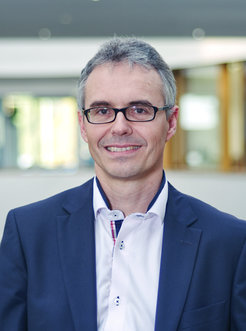Visiting Miller Professorship for Prof. Angel Rubio
In fall 2014, Prof. Angel Rubio, director of the Theory Department of the Max Planck Institute for the Structure and Dynamics of Matter, stayed for two months at the University of California, Berkeley as a Visiting Miller Professor.

The research interests of Prof. Angel Rubio are focused on the theory and the modeling of electronic and structural properties of condensed matter, and the development of new theoretical tools to investigate the electronic response of materials, nanostructures, biomolecules and hybrid materials to external electromagnetic fields.
During his stay in California, Angel Rubio continued the development and use of non-conventional theoretical approaches for applications to address three major scientific challenges: the characterization of matter out of equilibrium, the control of material processes at the atomic level and the tailoring of material properties, and the mastering of energy and information on the nanoscale to propose new devices with capabilities similar to living things (biomimetic materials).
Besides starting collaborative projects with groups located in Berkeley, Angel Rubio gave six seminar and colloquium talks during his Visiting Miller Professorship: at the University of Rochester, at the Stanford University, at the Molecular Foundry at the Lawrence Berkeley National Laboratory, and at the physics, mathematics and chemistry departments of the University of California, Berkeley.
The stay of Angel Rubio put the seed for a long-term collaboration with the Berkeley groups in physics, chemistry, materials science, and Earth sciences to achieve theoretical tools for the quantitative prediction and characterization of energy and charge transfer phenomena in real systems such as two-dimensional materials, photosynthetic complexes and photovoltaic materials.
The Miller Institute for Basic Research in Science annually awards several Visiting Professorships to eminent or promising scientists as a foundation for collaborative research projects with scientists at the University of California, Berkeley.
